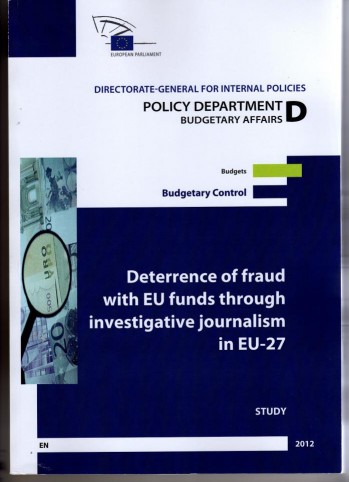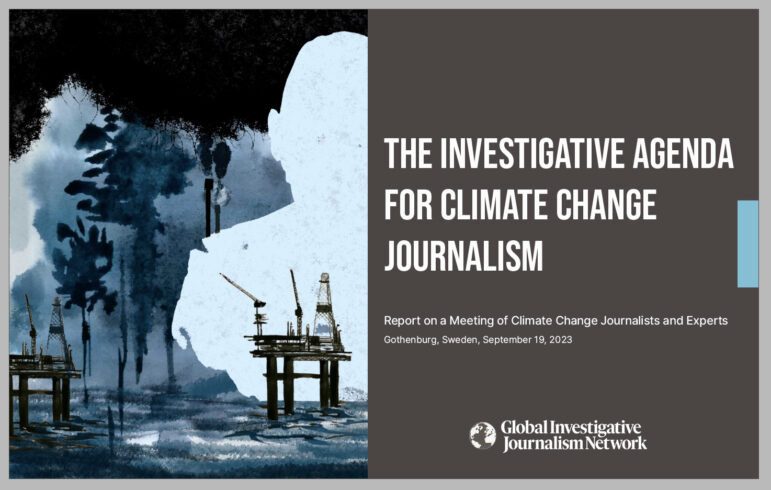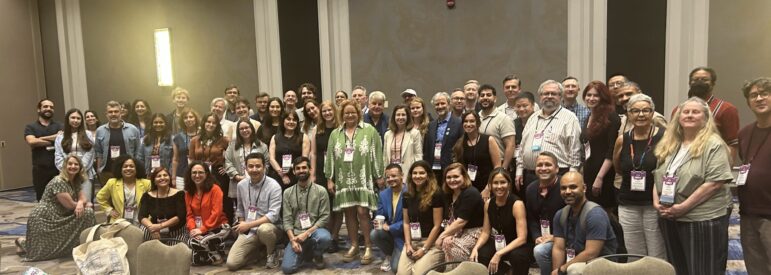

Investigative Journalism’s Key Role in Deterring Fraud
For five-and-a-half-months, a team of European journalists has researched, at the behest of the European Parliament, the critical role that investigative journalism can play in deterring fraud in the European Union. Their nearly 300-page report, released today in Brussels, is a landmark study that makes a powerful case for the contribution that investigative reporting makes “to greater transparency on this issue, tracking irregularities, fraud and corruption, and uncovering misspending on different levels and scales in the EU member states and the EU institutions.”

The report, Deterrence of Fraud with EU Funds through Investigative Journalism in EU-27, was commissioned by the European Parliament’s Budgetary Control Committee and carried out through two GIJN member organizations: the Fonds Pascal Decroos (the Brussels-based Pascal Decroos Fund for Investigative Journalism) and the Vereniging van Onderzoeksjournalisten (VVOJ — the Dutch-Flemish Association of Investigative Journalists), whose director Margo Smit served as the report’s principal author. Co-authors include Brigitte Alfter, Mar Cabra, Annamarie Cumiskey, Ides Debruyne, Marcos García Rey, Rafael Njotea, and Albrecht Ude.
Here’s the report’s executive summary, reprinted below. Interested readers can find a PDF of the full report at the European Parliament’s website.
EUROPEAN PARLIAMENT
Directorate General for Internal Policies
Police Department D: Budgetary Affairs
DETERRENCE OF FRAUD WITH EU FUNDS THROUGH INVESTIGATIVE JOURNALISM IN EU-27
Executive Summary
Background
In the fall of 2011, the European Parliament Committee on Budgetary Control called for a study on deterrence of fraud with EU funds through investigative journalism in the European Union member states. Could investigative journalism be instrumental in the detection of and fight against corruption and fraud with EU funds, and if so, how?
With fraud and corruption often perceived to be ‘victimless crimes’, journalistic enterprise could be instrumental in showing scope, execution and consequences of misspending, and the effects of anti-fraud policies, thus informing the true victims of these crimes: the European citizens. They, in turn, could then pressure their representatives in the member states and EU institutions to tackle the wrongdoing, close loopholes and make European spending more efficient and transparent.
This study aims at showing the extent and content of investigative reporting on European expenditures and revenue, the reasoning behind engaging in this type of research, and – if possible – the effect and impact of stories. Analysis of best practices and impediments will lead to recommendations on how to enlarge the amount of investigative reporting, and thus enhance the role critical and in-depth reporting into EU funds can play in deterring fraud and misappropriation. The study’s specific terms of reference requested to formulate recommendations to the EU institutions, but this report also aims at the Professionals in journalism themselves.
Execution of the study
In order to be able to analyze the role of investigative journalism on EU spending and distinguish between arguments originating with the investigative journalism practice in general and the arguments having to do with the topic, European funds, this study first paints a picture of the investigative journalism landscape within the EU-27 and the ‘European’ press in Brussels.
The research team’s extensive network in Europe and in particular the EU was put to work on providing background on the state of investigative journalism in the network members’ respective countries. After defining the relevant terms of research (investigative journalism, fraud, funds and Europe, see Chapter 1), close to one hundred journalists and dozens of officials at the institutions were interviewed by e-mail, over the phone or in person. This information was collated and combined with a large number of existing overviews into relevant aspects of journalism.
This resulted in Annex 1, 2 and 11 providing overviews of the investigative landscape and of stories on expenditure and revenue of EU funds.
The overview of stories (Annexes 2 and 11) could not be quantitatively exhaustive, but is qualitatively representative. The overall number of stories is relatively small considering the timeframe (5 years in 27 Countries), unevenly divided over the member states (with the UK alone providing over 30% of the Stories), one-dimensional (almost entirely expenditure- and hardly revenue-driven), personal (focusing on individual people or companies), and incidental (highlighting ‘silly’ projects instead of structures Enabling fraud). Only a few larger, more structural research projects could be identified (Farmsubsidy.org, fishsusidy.org, ICIJ project ‘Looting the Seas II’, Bureau of Investigative Journalism/Financial Times project ‘Europe’s missing billions’, Romania’s Transparenta Fondurilor Europene).
If done in a systematic manner, a common trait to projects is journalistic co-operation, pooling of resources and skills (see Annex 4 and Chapter 4). A shift can be seen towards publication of EU investigations at investigative centres and/or in the new media, using the many possibilities the Internet provides to add data and documents, background, context and methodology.
Based on this mapping exercise, the research team in Chapter 2 analyses general aspects to the European investigative landscape influencing circumstances for investigative reporting, such as organisational models, work pressure and intimidation, business models, access to data and documents, press freedom, media pluralism and whistle-blowing and protection of sources legislation. When analysing the investigative journalism ecosystem in Europe and the many aspects that play a part in the decision of journalists to engage in critical and in-depth reporting, three key words come up:
- Prioritisation: doing investigative journalism is a conscious decision, if a medium wants this type of output, time and resources need to be devoted to get it;
- Determination: both individual journalists and newsrooms wanting this type of output get it by being in it for the long haul;
- Co-operation: pooling resources and skills helps in raising the level, output and impact of investigative output.
Chapter 3 focuses on the topic of investigating European expenditures and revenue, and analyses a set of arguments for (not) doing these long-form, time-consuming and expensive investigations. Reasoning behind this, also due to the vast differences in the investigative journalism landscape in Europe (as described in Annex 1) is manifold:
- organisational (no priority to EU fraud stories, no newsroom organisation advancing investigative reporting),
- financial (lack of money),
- practical (availability of tips, leaks, difficult access to and lack of comparability of data and documents),
- political (either a partisan or a very EU-sceptic press),
- engrained in the journalistic mindset (stories need a clearly identifiable protagonist and striking examples where EU funds stories are often ‘system’ stories)
- economically motivated (concentration of ownership or media affiliation to local industries)
- a lack of journalists’ freedom to investigate what they see fit.
To go deeper into certain aspects of investigative reporting on EU spending and thus identify impediments and best practices, Chapter 4 zooms in on six so-called focus countries and one area of interest. Looking at Romania, with the regular media mostly ignoring the topic of tracking EU funds, a co-operative NGO/journalists initiative did the digging, helping local journalists to identify stories based on a database of Romanian figures, but the project had to be abandoned after three years for lack of money. Recommendations are made based on this project, urging the EU to ‘go local’, with training and with tailor-made grants for research projects and stories.
The paragraphs on Spain show the power of international, cross border cooperation when the national press is busy weathering a major economic crisis. From the ‘Looting the Seas II’ project come recommendations on training and setting up cooperative journalistic efforts.
In Hungary, critical and in-depth reporting is suffering from the threats of a highly controversial new media law. But the paragraphs also show an interesting shift of in-depth reporting from partisan traditional media to the Internet.
The United Kingdom paragraphs highlight the almost exclusive national angle that EU reporting takes in this member state. Special attention is paid to one of the few large-scale data journalism projects done on the appropriation of EU funds. Again, recommendations are made, about collection and reporting of data sets and journalistic cooperation.
In Italy, investigative journalism until fairly recently was as partisan as politics: reporters investigated the opposing faction and ignored ‘their own side’. However, since 2009 some media initiatives take on the public demand for coverage the mainstream media is not providing, in the process proving there is a paying market for truly independent in-depth reporting. Some even call it the ‘renaissance’ of investigative reporting, despite the harsh political and economic climate.
Denmark, with high professional standards within journalism, a well-established community around investigative reporting, excellent in-job training facilities and investigative units at most major media, shows yet little evidence of scrutiny of EU funds. In this study, several editors of investigative editorial units are challenged to search for explanations as to why: a lack of prioritisation.
Finally, in a paragraph on the European institutions the study elaborates on the possibilities for cooperation between journalists and the EU as seen from the perspective of officials in Brussels.
From this chapter can be concluded that in Brussels, as in many other places, open communication between journalists and officials leads to better stories, not just on spending of EU money. Communication may lead to trust and thus to closer cooperation. With an emancipating public’s rising call for transparency on data, documents, regulations, execution and effects of policies, the communication and the journalism community should find common interests and develop strategies to work together. It is not for the journalist to do the communicator’s job, nor for the communicator to prescribe the journalist what to do. But both are ‘gate watchers’ in constructing European civil society in which there is no place for fraud and corruption, with the EU officials guarding the gate to the building blocks of information, and the journalists the gate to the inhabitants of the house of Europe. Watching the gate can be done, but it needs constant maintenance.
Conclusions and Recommendations
Five and a half months of research into the possible deterrence of fraud with EU funds through investigative reporting shows there are clear examples of the contribution journalists have made to greater transparency on this issue, tracking irregularities, fraud and corruption, and uncovering misspending on different levels and scales in the EU member states and the EU institutions. However, a quantification of the cases uncovered or the funds recovered cannot be made, due to the complexity of the matters, the long run of investigations and trials in member states, the impossibility of anti-fraud bodies to reveal the origin of sources of their investigations, and the scanty reporting on the effects of anti-fraud policies and measures. One attempt was made, by researchers in one country (Slovakia, see Annex 2, page 2), but that overview could be no more than patchy.
Since the reasoning behind the wide variety in journalistic interest, enterprise and output on European spending is as multifaceted as Europe itself, so are the recommendations for enlarging the role of investigative journalism in tracing irregularities and fraud (presented in Chapter 5). Though there are remarks and issues transcending the individual and incidental, both on the journalistic and the institutional side.
- There is a loud call, from journalists and EU officials alike, for uniformity in gathering, cataloguing, collecting, archiving and reporting of data, to be mandated by the European institutions and sanctioned for non-compliance.
- Clear definitions and broad interpretation (in line with the Lisbon Treaty) of what constitutes a document, and a swift implementation of workable FOI laws across the Union are seen as imperative, as is systematic, proactive and centralised disclosure of data and documents in a manner that passes the ‘Grandma’ test.
- There should be a larger role for the EU bodies in enabling, monitoring and when possible enforcing media pluralism (ownership), protection of sources and whistleblowing rules, and press freedom in general.
- The level of journalistic professionalism needs to be raised, through targeted training, presentation of best practices (of co-operation, skills and organisational models) and research into sustainable business models.
- The emerging role of investigative centres in doing long-form, time-consuming and thus high-resource research such as tracking EU spending and revenue cannot be denied and should be further explored. Development of a central European ‘hub’ for generating, aiding and executing these projects should be considered.
- Brussels bureaucracy, both in access to data and documents and in granting money to (journalistic) projects and organisations working in (the periphery of) the area of the financial workings of the EU should be reduced, to ensure transparency and speed of the granting and reporting process.
- Finally on both sides of the aisle, there is a drive for co-operation and collaboration. Journalists, against the grain, are sharing (re)sources, methodology, results and even scoops. These projects are simply too large and complex for one reporter or media outlet. On the other side, EU officials would like to explore wider possibilities for (regular) contact, (within legal and privacy possibilities) sharing of information and results and collaboration in deterring (mis)appropriation of EU money. Networks of officials at EU and national levels, journalists, academics and NGOs can and have to build trust and mutual understanding, creating an open environment for reporting on expenditure and revenue fraud.
With these recommendations in mind, sound investigative journalism dealing comprehensively with all types of EU spending could help citizens understand the added value of most of this spending, uncover hidden cases of misspending and fraud, and in the end have a preventive effect on certain cases of misspending and fraud. Investigative reporting’s findings could then help politicians, funds managers, prosecutors and legislators to take appropriate measures.
Brussels © European Union, 2012
Margo Smit, director of the Flemish-Dutch organisation of investigative journalists VVOJ, was asked by the Pascal Decroos Fund to be the coordinator and principal author of the study. Co-authors were Journalismfund.eu’s Brigitte Alfter, Spanish investigative journalists Mar Cabra and Marcos García Rey, British EU journalist Annamarie Cumiskey and German Albrecht Ude. The Pascal Decroos Fund’s director Ides Debruyne acted as project manager, while communication manager Rafael Njotea provided editorial assistance.









